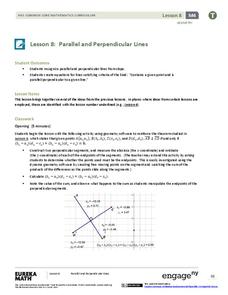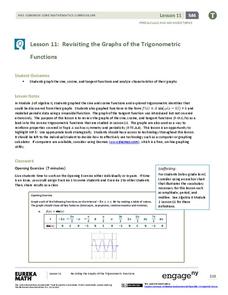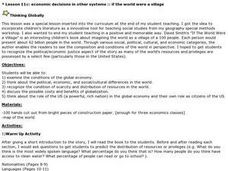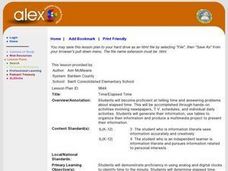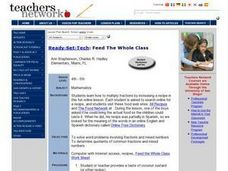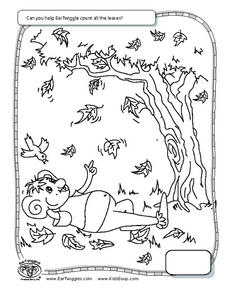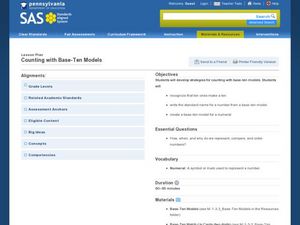EngageNY
Parallel and Perpendicular Lines
Use what you know about parallel and perpendicular lines to write equations! Learners take an equation of a line and write an equation of a line that is parallel or perpendicular using slope criteria. They then solve problems to...
Curated OER
Multiplication Snack Activity
Youngsters study multiplication facts by manipulating food in order to problem solve. They will use healthy snack items as manipulatives to solve various multiplication equations. Charts, tables, physical models, and so much more are...
Curated OER
Discovering pi
Tenth graders investigate the history of Pi and how it relates to circles. In this geometry lesson, 10th graders measure the circumference of a circle and the diameter of a circle. They relate these measurements to the number of Pi or 3.14
Curated OER
Benefits of Indoor Plants
Learners diagram a plant. In this Science activity, students explore the concept of photosynthesis focusing on the oxygen production. Learners calculate the amount of plants needed to filter the air in their classroom.
Curated OER
Make a Solar Oven
Students build a solar oven. In this Science lesson, students construct a functional solar oven. Students design the oven and explain the energy concepts involved.
EngageNY
Types of Statistical Studies
All data is not created equal. Scholars examine the different types of studies and learn about the importance of randomization. They explore the meaning of causation and when it can be applied to data.
EngageNY
Revisiting the Graphs of the Trigonometric Functions
Use the graphs of the trigonometric functions to set the stage to inverse functions. The lesson plan reviews the graphs of the basic trigonometric functions and their transformations. Pupils use their knowledge of graphing functions to...
Kenan Fellows
Weight and Balance of an Airplane
A career in aeronautics might be calling your class members. Building from the previous two lessons in the series, learners continue analyzing the mathematics of aeronautics. Groups create a paper airplane using paperclips for balance....
Curated OER
If the World Were a Village...
Your class members explore concept that the world is a large place, examine how statistics can be used to help in understanding the world and its people, and create illustrations or graphs of statistics found in the award-winning...
Curated OER
Time/Elapsed Time
Young mathematicians complete various activities to demonstrate proficiency in telling time and identifying elapsed time. They analyze and discuss television schedules, create a booklet about their daily activities, produce a TV. guide,...
Curated OER
Number Patterns
Help your students to identify even and odd numbers. For this number sense lesson, they read the book Madeline and use counters to identify which number has a "partner." Learners write down odd and even numbers on a whiteboard.
Council for Economic Education
Calculating Simple Interest
How much is owed? A calculated resource introduces the simple interest formula with a video that describes how to use it. Classmates then show what they know by answering questions within a simple interest worksheet.
Math Worksheets Land
Multistep Ratio and Percent Word Problems - Step-by-Step Lesson
What happens when you have a recipe and need to up the measurements? Here is a lesson that explains how to use ratios to convert measurements and percents with worked out problems. Also provided are additional resources and practice...
Statistics Education Web
First Day Statistics Activity—Grouping Qualitative Data
Making groups of groups can help to organize data. Classes use statistics to group themselves using descriptive adjectives. The objective is for learners to understand that grouping qualitative data is useful when the original groups are...
American Statistical Association
How Fast Are You?
Quick! Snap up the instructional activity. Scholars first use an online app to collect data on reaction times by clicking a button when the color of a box changes. They then plot and analyze the data by considering measures of center,...
Curated OER
The Internet Pizza Server - Pizza Simulation
Learners simulate going to a pizza restaurant, ordering a pizza, and determining whether a small, medium, large, or family size pizza is a "better-buy." Students calculate the price/per/topping and determine whether this price is "fair"
Curated OER
The Luxor Hotel Contract
High schoolers determine the surface area of the Luxor Hotel, using the square feet of the base, volume, and the volume formula. They create a scale model of the triangular/pyramid shaped hotel.
Curated OER
Beans, Beaks and Bears
Learners explore evolution. After watching a video on evolution, students perform a variety of experiments using beans which illustrate the concept of evolution.
PBS
The History and Use of Sampling Methods
Young mathematicians define population, draw convenience sample from the population, draw quota sample from the population, and draw random probability sample from the population. They explain why a random probability sample usually...
Curated OER
Feed The Whole Class
Students solve word problems and determine quotients of fractions and mixed numbers. They practice multiplying fractions by increasing a recipe found on a food website. In addition, they increase the numbers to feed the whole class a...
Curated OER
EarTwiggle
In this counting leaves worksheet, students assist EarTwiggle in counting all the leaves found within a piece of art and then place their answer in the box provided at the lower right hand corner.
Curated OER
Using Groups of Ten to Solve Problems
Upper graders solve math problems involving multiplication using specific strategies. They will use base-ten blocks, hundreds charts, and number lines to solve multiplication problems. Then they will practice several of the strategies...
Curated OER
Many Ways to Represent Our Data
Demonstrate several ways to represent data with your class. They will use surveys to gather data and display the data using tally charts and graphs. Then answer questions according to the data.
Curated OER
Counting with Base - Ten Models
Help your kids develop strategies for counting. In this base-ten lesson, learners use matching cards, base 10 blocks, and dry erase markers and boards to examine the base 10 counting system.


